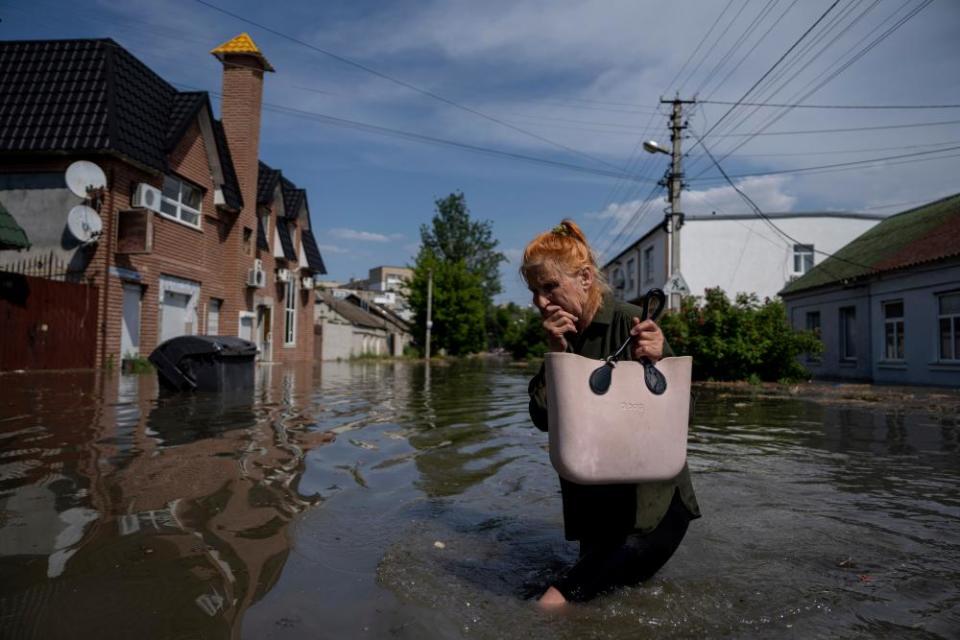Dam breach could be Ukraine’s ‘worst ecological disaster since Chornobyl’

Ukrainian scientists are waiting for the water to subside before fully assessing the environmental impact of the Kakhovka dam breach, but one former minister warned it could prove the country’s worst ecological disaster since the Chornobyl nuclear meltdown.
Ukraine’s president, Volodymyr Zelenskiy, called an emergency meeting of his security council after the partial collapse of one of the biggest dams in the world. The country’s public prosecutor said it is investigating a possible case of “ecocide”.
Ukraine and Russia have each accused the other of deliberately blasting the main concrete barrier. Other media point to satellite data that shows a road across the dam was already partly inundated in recent days and that water levels were at a record high.
The German foreign minister, Annalena Baerbock, blamed Russia’s invasion of Ukraine for the collapse and described the explosion as an “environmental catastrophe”.
Analysts told the Guardian that the scale of the damage would depend on the amount of water released and the extent of the damage to the barrier, both of which are still unknown. At the very least, it has forced the evacuation of thousands of people, flooded national parks and jeopardised water supplies to millions of people. In the worst-case scenario, it may pose a long-term danger to Europe’s biggest nuclear plant, Zaporizhzhia, and could also spread agrotoxins and petrochemicals into the Black Sea.
The International Energy Agency tweeted that its experts at Zaporizhzhia, which is 100 miles (160km) upstream, are closely monitoring the situation. They said there was “no immediate nuclear safety risk at plant”, because the cooling pools are already full.
This could change in the future, if the reservoir behind the dam is significantly depleted, which would make it difficult to replenish the cooling system and operate the diesel generators.
Former minister of ecology Ostap Semerak told the Guardian that in his opinion this was the greatest threat currently posed by the breach, but other dangers could emerge in the days and weeks ahead as flood waters engulf cities, petrol stations and farms, become contaminated by agrochemicals and oil products and then flow into the Black Sea.
“This will have an impact on Romania, Georgia, Turkey and Bulgaria. It will be harmful for all the region” he said. “Our government has announced this is the biggest environmental catastrophe in Europe over the past 10 years, and I think it may be the worst in Ukraine since Chornobyl in 1986.”
The turbine room at the hydropower plant is already under water and 150 tonnes of industrial lubricants have been washed away, according to Zelenskiy.
Olena Kravchenko, the director of the Ukrainian Environment People Law NGO, said Russia’s “ecocide” risked “unprecedented environmental consequences” to the areas downstream of the Dnipro River, the Dnipro estuary, and ecosystems in the coastal area of the Black Sea.
With images of entire houses being washed away, she says the river will be polluted by debris and hazardous chemicals. Water supplies could be reduced or cut in several cities, including Kherson, and irrigation may prove impossible in swathes of agricultural land, affecting crops.
She expected to see mass mortality of fish, mollusks and other aquatic species, widespread habitat disruption and negative impacts of ecologically important national parks: Nyzhniodniprovs’kyi, Kam’yanska Sich, Biloberizhzhia Sviatoslava, the Black Sea Biosphere Reserve (which is also a Unesco biosphere reserve) and the Kinburn Spit Regional Landscape Park.
In addition, she says landmines will be moved and covered by silt, which will make them harder to locate and dismantle.
She argued that if Russia had breached the dam, it would be sufficient for a charge of “ecocide” under Article 441 of the Criminal Code of Ukraine.
Denys Tsutsaiev from Greenpeace Central and eastern Europe told the Guardian that the dam destruction caused by the Russian military presence “once again puts in danger thousands of lives of civilians and nature”.
“This is a very big disaster, but it is too early to assess the impact and difficult to compare with what has happened before,” said Tsutsaiev. “We don’t know yet how much the dam is damaged.”

 Yahoo News
Yahoo News 